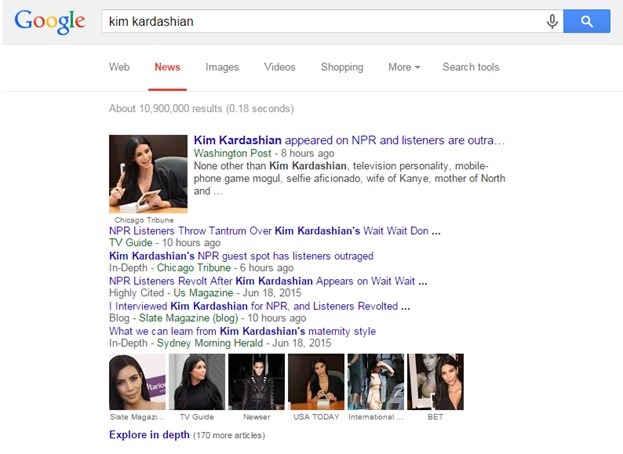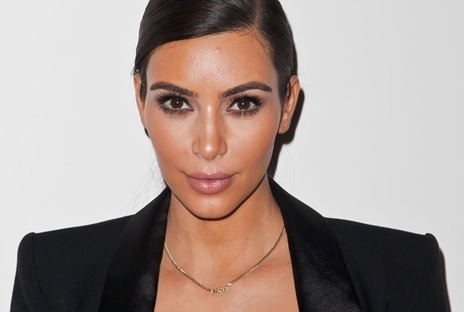A story that made the rounds in public radio circles last week has now broken out into the mainstream media.
It all started when NPR’s wildly successful, Peabody Award winning weekly news quiz show – Wait Wait…Don’t Tell Me! – had the audacity to book Kim Kardashian. Apparently, the main force behind Keeping Up With The Karadashians isn’t intellectual or credible enough for some NPR fans. From Slate to New York to the Chicago Tribune, they’ve all covered the story about the disappointment, anger, and vitriol express by outraged listeners over the most famous Kardashian’s appearance on a public radio comedy show.
It is one thing to be protective of a show or even a network you love and even financially support. It’s another to go on the attack, and even threaten to pull support from public radio, as a number of fans did.
This public radio programming flap became so viral that a Google News search of “Kim Kardashian” late last week yielded these results:
With more than 170 articles written about this non-story story, Kim’s appearance on “Wait Wait” clearly out-performed an earlier guest shot this year from Robert Baer. (Who’s Robert Baer? He’s a former CIA officer who has written a series of memoirs, some of which have made it movies.)
You can listen to the Kim Kardashian guest shot here, as she takes part in a quiz hosted by Mike Pesca, sitting in for Peter Sagal. It is actually quite entertaining.
The blowback got so powerful that NPR’s ombudsman (yes, they have one) got into the act. In a response called “What’s All The ‘Kommotion’ About Kim Kardashian on ‘Wait Wait’?,” Elizabeth Jensen attempted to make a considered response to the audience outrage.
Taking on all these “disappointed” and “disgusted” listeners, Jensen reminded them that Wait Wait is, in fact, a comedy show, and that Kim Kardashian was gracious. But angry listeners insisted that featuring her as a guest on a public radio program lowers the standards and demeans the network.
Mike Danforth, Wait Wait’s executive producer, defended Kim’s appearance by saying, “Of course we tried to book her, because she’s huge…We always try to book people who are culturally relevant.”
But like others at NPR, he did not anticipate the elitist venom that followed the broadcast. And as Jensen quoted listener Max Planck: “I’ll forgive you this time but don’t do it again.” Surely, the NPR ombudsman has more important problems and controversies to explain, defend, or unravel.
Actually, NPR would be wise to “do it again.” Kardashian isn’t just culturally relevant. She’s a force of nature. And her business acumen could easily land her with air time on Marketplace to discuss how to cash in on fame, fortune, digital platforms, and videogames. Or on On The Media to talk about how her enormous fame has made her a multi-media phenomenon. Or even on Fresh Air so Terry Gross could use her world class interviewing skills to show us a side of Kim Kardashian we’ve never seen before (seriously).
NPR specifically, and public radio in general, have a way of presenting personalities and issues in ways that are unlike the way we experience them in other media outlets. And in their quest to grow their audience, interesting, successful, and controversial people are fair game for their many great programs.
There’s a tendency to overreact to vehement core listeners. Oftentimes, a single complaint makes its way up to the C-suite. In this case, the clamor, commotion, and kerfuffle from NPR’s minions don’t merit a response.
So my advice to NPR and the rest of the public radio community would be this:
Don’t let the mob dictate your programming. You grow and stay relevant by trying different things and taking risks.
That said, don’t let Garrison Keillor get any bright ideas.
- What To Do If Your Radio Station Goes Through A Midlife Crisis - April 25, 2025
- A 2020 Lesson?It Could All Be Gone In A Flash - April 24, 2025
- How AI Can Give Radio Personalities More…PERSONALITY - April 23, 2025






When was the last time NPR got this much free marketing/publicity? Maybe never. Shout out to them for the whole thing…whiny nerds…you’ve been had by the mothership!
Admittedly, we’re not talking about the majority of NPR listeners here, Bob, but a little trust in the “mother ship” wouldn’t be a bad way to look at it. Thanks to public radio, we learn a great deal about all kinds of people. Thanks for the comment.
The problem is that these sort of complaints have been going for several years now, from about the time that David Giovannini started picking up clients. You should’ve seen the angry comments when “All Things Considered” interviewed “Bachelor” host Chris Harrison a month ago. It’s basically a belief of many longtime listeners that public radio should be their shield from the distasteful sides of daily life like pop culture, rock and roll, comic books, video games and anything high-tech and should only be earnest discussions of the major issues of the day (except, of course, when it’s Garrison Kellior talking about Lake Woebegon and croaking along with folk singers). Public radio (with the help of Giovannini and, truth be told, Fred) has broadened their canvas in recent years to attract the upper-income, highly-educated Gen-Xers who did NOT start listening to classical music and jazz when they turned 35, still read comic books, play video games and hatewatch “The Bachelor” and “Keeping Up with the Kardashians.” (It also happens that this also reflects the personal tastes of some of the people who work in public radio–both Ira Glass and John Hockenberry have been pilloried by the taste police for admitting that they love Howard Stern.) When you consider that in market after market, NPR stations are beating right-wing talkers in the PPMs (and the right-wing talkers that are still ahead of NPR are mostly the ones with strong sports franchises or a news-based morning drive), it points out a long-held belief of mine–if the far-left and far-right nutcases hate NPR so much, they must be doing something right.
Mark, thanks for the insightful comments. Truth be told, public radio brings an amazing sense of clarity to pop culture icons, reminding us that artistry and craft in exist in many forms. Public radio is evolving, along with the rest of us, and seems to always find a way to make just about any topic or person interesting because of its unique context. Appreciate you taking the time.
This is a rare incident but I would like to say, with the utmost respect, that I totally disagreed with this post.
The Kim K interview didn’t go over well because NPR was not true to their brand. A Kim K interview about a selfie book is not reflective of why people listen to NPR and NPR failed to fulfill their listener’s brand expectations. As one complaining listener said, “I listen to NPR to get away from Kim K. and mainstream trash and here they were interviewing her!” (total paraphrase on my part). The sole argument for having her on NPR seems to boil down to her being famous … We NPR listeners (perhaps foolishly) had always believed that the bar to be on NPR was higher than that.
Granted, “Wait, Wait” is (only) a comedy show, but it is still a “witty” comedy show. It is not a slap-stick comedy show, a Boobs & Beer comedy show, a David Chappelle-like comedy show, etc. And it is not any of those types of comedy shows because that would not align with the NPR brand…
One argument I’ve heard for why it was a good booking was that it got NPR elitist listeners (i.e. me) to look outside of their insular worlds~ Kim is mainstream culture whether we like it or not…And this would be fair argument, if NPR hadn’t spent millions of hours and dollars building their brand to be the exact anti-thesis of a Kim K interview promoting her book of selfies…. As you already stated, there may have been ways to bring Kim to NPR in a way that aligned with the NPR brand but this wasn’t it. This was total brand dissonance (or brand disillusionment).
Building brands is about building a community of people with like-minded values and expectations about your brand. And branding is why hard-rocking stations don’t play Celine Dion. Celine may be a great singer but she is not the reason people turn on a rock station and the rock station is smart enough to know that.
Jacquelyn, I very much value your feedback, and appreciate you being on the other side of us on this one. As you note, it’s rare.
That said, I don’t think the intention was to get NPR to stretch their audience’s sensibilities. I think it was about bringing on someone who’s interesting and unusual, and in this case, putting her in the “Wait Wait” world. You could make the case for George Clinton, Lance Bass, and Marky Ramone – all of whom fall outside someone’s “NPR zone” and all who have guested on the show in recent months.
NPR is about interesting people, often cast in a light outside their comfort zones. I gave some examples of how Kim could be treated by other NPR shows, all of which could turn out to be fascinating radio.
But I totally get the “be true to your brand” argument that you make, and would love to hear from others on the topic. Thanks for taking the time to comment and for your honesty.
It’s beautiful poem Desiderata wrote by Max Ehrmann. That issue with Kim K. reminds me words…
“and listen to others,
even the dull and the ignorant;
they too have their story.”
I agree with your advice 🙂
Thanks, Pawel, for that timely reminder.
I think it’s pretty brave programming to expose a fanbase that tends to be a bit snobby to “low culture”. This is a comedy show, and Kim has shown a willingness to laugh at her own public image. Sounds like she’s a better sport than some of these listeners, who need to remove the sticks from their posteriors and have some fun.
Don, I think that is indeed the point. There are a lot of interesting people in this world, beyond those in politics or “the arts.” Public radio has the ability to show different sides of famous people, and that’s one of their true values. Thanks for the comment.
AMEN BROTHER. Pay attention to complaints. Respond to complaints. But DON’T be RULED by complaints. About a year ago I made a program change and I tracked every complaint on a Post-It note that still hangs in my office. The hash marks show 44 people called or e-mailed. 43 opposed the change. One liked it. A half dozen cancelled their memberships.
One complainant called 10 months after it disappeared, saying “It’s my favorite show!”
Then the ratings came out. Listening for that time period increased by 50%. The silent majority supports the change.
Mike, thanks for the story, and the reminder that the vocal minority can emotionally impact management teams. Having a deeper understanding of what you’re doing something and its strategic purpose can keep you focused during the firestorm of complaints. Appreciate you taking the time.